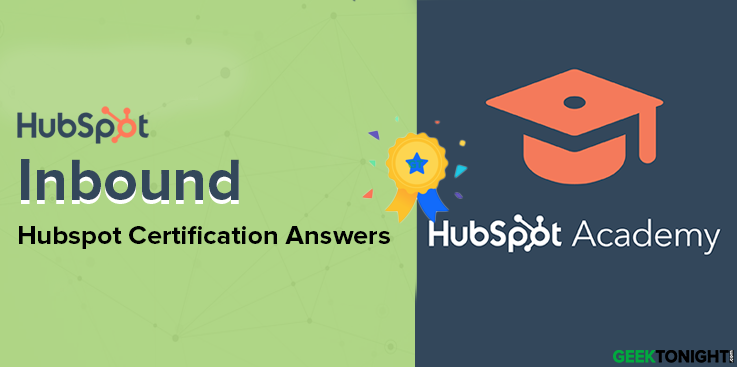Exam Name: HubSpot CMS for Developers Certification Exam
Exam URL: https://academy.hubspot.com/courses/cms-for-developers

Here’s what you need to know before taking this exam:
- There are 60 questions.
- The exam takes about 1 hour to complete.
- You must answer 45 questions correctly to pass.
- You must wait 12 hours between attempts.
- You have 3 hours to complete the exam.
- Check your answers before submitting. You can’t go back and change them after you click submit.
Good luck.
Table of Content
- 1 What is the buyer’s journey?
- 2 If your content is focused on the different solutions to your buyer persona’s problem, where would that content fit into the buyer’s journey?
- 3 Which departments should be involved in creating content?
- 4 True or false? Most buyers start researching potential solutions before they meet with a salesperson.
- 5 True or false? A customer’s buying journey is ever-evolving. You should make updates as you learn more about your buyer persona.
- 6 Fill in the blank: Your __________ is your strongest acquisition lever.
- 7 What does CRM stand for?
- 8 What are the stages in the inbound methodology?
- 9 True or false? Attracting is the role of marketing. Engaging is the role of sales. Delighting is the role of services.
- 10 When does the engage stage of the inbound methodology begin?
- 11 What is the purpose of the delight stage of the inbound methodology?
- 12 True or false? As buying behavior changes, the inbound philosophy will also evolve.
- 13 Who is responsible for delighting prospects and customers?
- 14 The inbound methodology is a circle. What does it represent?
- 15 True or false? It’s a best practice to gate and deliver the majority of your content over live chat.
- 16 Which of the following is NOT true about a flywheel?
- 17 True or false? Every customer has to have a fantastic experience in order for your company’s flywheel to accelerate.
- 18 How can you apply flywheel thinking to your company’s budget?
- 19 In a flywheel business, which of the following is the most important source of new prospects?
- 20 What is the relationship of funnels and flywheels to each other?
- 21 How can thinking of your business as a flywheel foster cross-team collaboration?
- 22 What is the relationship between the inbound methodology and the concept of a flywheel?
- 23 True or false? Every business exists primarily to create profits.
- 24 Which of the following is the best way to align a company’s employees around a single purpose?
- 25 Which of the following is NOT a key part of a company’s culture?
- 26 What is Jobs Theory?
- 27 When you use Jobs Theory to develop a timeline of events, where does that timeline start?
- 28 According to Jobs Theory, which of the following is an example of a job story?
- 29 Which of the following is NOT a “job dimension” that Jobs Theory might uncover?
- 30 How does your company’s purpose affect “back office” teams (accounting, legal, etc.)?
- 31 Which of the following best describes a buyer persona?
- 32 Who at your company will buyer personas most benefit?
- 33 Who should be involved in creating your buyer personas?
- 34 What is the role of “back office” teams (accounting, legal, etc.) in creating buyer personas?
- 35 True or false? There should be one person who is tasked with creating and maintaining your buyer personas.
- 36 What is the relationship between your company’s purpose and your buyer personas?
- 37 What kinds of information does your marketing team likely need included in a persona?
- 38 What kinds of information does your sales team likely need included in each persona?
- 39 What kinds of information does your customer service team likely need included in each persona?
- 40 If a sales rep is speaking with a specific person and discovers that the person doesn’t exactly match their assigned persona, what should the sales rep do?
- 41 When it comes to goal setting, what are key results?
- 42 True or false? Objectives typically have a designated time period, while key results can be long lived.
- 43 What is the three horizon framework?
- 44 In the three horizon framework, what does horizon one symbolize?
- 45 In the three horizon framework, what does horizon three symbolize?
- 46 True or false? If one horizon begins to underperform, you should reallocate resources to those initiatives until they start performing well.
- 47 What’s the maximum number of top priorities a company should have at any given time?
- 48 Fill in the blank: You can attract people by using _________ to create content and experiences.
- 49 In the engage stage what do you collect from an individual?
- 50 What might your customer service team use the buyer’s journey for?
- 51 What is the relationship between a company’s profits and its purpose?
- 52 Your friend is starting a company and wants to identify the job their product will do for people. What advice would you give them?
- 53 Why is it important to make sure the people buying your product are happy?
- 54 True or false? If you want to think of your company as a flywheel, you shouldn’t think of your sales process as a funnel.
- 55 How can thinking of your business as a flywheel improve the handoff between sales and services?
- 56 Which of the following are principles of inbound? (Choose all that apply.)
- 57 Fill in the blank: During the attract stage of the inbound methodology, an inbound business focuses on __________________. (Choose all that apply.)
- 58 Fill in the blank: _________ of consumers have discontinued communications with a company because of irrelevant promotions or messages.
- 59 Fill in the blank: _________ of customers will never do business with a company again after one negative experience.
- 60 Fill in the blank: To build trust with your target audience, you need to align with the way they _________. (Choose all that apply.)
What is the buyer’s journey?
- It’s the process that someone goes through after they’ve made a purchase.
- It’s the process our buyer goes through when learning about your brand.
- It’s the active research process someone goes through leading up to a purchase.
- It’s the inbound methodology, but from the buyer’s perspective.
If your content is focused on the different solutions to your buyer persona’s problem, where would that content fit into the buyer’s journey?
- Awareness
- Consideration
- Decision
- All of the above
Which departments should be involved in creating content?
- All departments
- Just marketing
- Just marketing and sales
- All customer-facing departments
True or false? Most buyers start researching potential solutions before they meet with a salesperson.
- True
- False
True or false? A customer’s buying journey is ever-evolving. You should make updates as you learn more about your buyer persona.
- True
- False
Fill in the blank: Your __________ is your strongest acquisition lever.
- content library
- current customer base
- inbound tool stack
- sales-qualified leads
What does CRM stand for?
- Custom Rendering for Mobile
- Custom Relationship Modules
- Customer Relationship Management
- Customer Rotation Model
What are the stages in the inbound methodology?
- Get Found, Convert, Analyze
- Attract, Engage, Close
- Attract, Engage, Delight
- Attract, Convert, Close, Delight
True or false? Attracting is the role of marketing. Engaging is the role of sales. Delighting is the role of services.
- True
- False
When does the engage stage of the inbound methodology begin?
- The engage stage begins when a purchase occurs.
- The engage stage begins when a customer leaves you.
- The engage stage begins when a prospect or customer takes a desired action.
- The engage stage begins when a prospect or customer proposes you give them a discount.
What is the purpose of the delight stage of the inbound methodology?
- To exceed expectations
- To provide an outstanding experience every time a prospect or customer interacts with your company
- To go the extra step to ensure a prospect or customer accomplishes what they set out to do
- All of the above
True or false? As buying behavior changes, the inbound philosophy will also evolve.
- True
- False
Who is responsible for delighting prospects and customers?
- Services
- Marketing and Services
- Sales and Services
- Marketing, Sales, and Services
The inbound methodology is a circle. What does it represent?
- funnel
- obelisk
- flywheel
- cyclone
True or false? It’s a best practice to gate and deliver the majority of your content over live chat.
- True
- False
Which of the following is NOT true about a flywheel?
- Flywheels store momentum.
- Flywheels represent a circular process rather than a linear one.
- Flywheels are able to stand unsupported for an indefinite amount of time.
- Flywheels accelerate as you add more energy to them.
True or false? Every customer has to have a fantastic experience in order for your company’s flywheel to accelerate.
- True – Even a single unhappy customer will scare away potential customers, so you need to hold your teams to a standard of pleasing every single customer they work with.
- True – If you aren’t providing a flawless customer experience to every one of your customers, you aren’t operating a flywheel company.
- False – Not all customers are going to be happy all the time, but your flywheel can counteract their unhappiness by increasing the total size of your customer base.
- False – Some customers are inherently difficult to work with, but thinking of your company as a flywheel will encourage your teams to provide as good of an experience as possible even to your most difficult customers.
How can you apply flywheel thinking to your company’s budget?
- By investing as much money into things that drive customer happiness, such as support teams and product improvements, as you do into acquiring new customers through marketing and sales.
- By making sure funds are evenly distributed to each section of the flywheel. Marketing, sales, and customer support should each have equal proportions of the overall budget.
- If your flywheel is truly successful, you won’t need to allocate resources to marketing at all because customer word of mouth will provide all of your new prospects.
- If your flywheel ever slows down, you can speed it back up by funding more customer discounts.
In a flywheel business, which of the following is the most important source of new prospects?
- Marketing
- Sales
- Advertisements
- Word-of-mouth
What is the relationship of funnels and flywheels to each other?
- The flywheel replaces all funnels.
- A flywheel and a funnel represent the same basic premise.
- Individual funnels can be interconnected within a flywheel.
- Creating a flywheel is the first step in developing a robust funnel.
How can thinking of your business as a flywheel foster cross-team collaboration?
- If each team has separate funnels, a flywheel can help them understand how those funnels fit together and support each other.
- It’s impossible for a funnel to apply to multiple teams.
- Funnels inevitably cause friction between teams.
- A flywheel replaces the standard org chart by showing each individual employee and team their relationship to every other employee and team.
What is the relationship between the inbound methodology and the concept of a flywheel?
- The inbound methodology has arrows to show the direction your flywheel should spin.
- The inbound methodology is round to help you visualize your company as a flywheel.
- The only way to make your company operate like a flywheel is to use inbound techniques.
- The inbound methodology represents a funnel that exists in one part of your company’s flywheel.
True or false? Every business exists primarily to create profits.
- True – A business might have other goals it wants to achieve, but its leaders must be focused on profits first in order to achieve those other goals.
- True – A business only exists to create profits for the people it employs.
- False – Although most businesses have to generate profits in order to sustain themselves, every business exists to fulfill a specific purpose.
- False – Businesses should not think about profits at all. Instead, they should find a higher purpose to fulfill.
Which of the following is the best way to align a company’s employees around a single purpose?
- Defining a company culture that encourages employees to focus on fulfilling the company’s purpose.
- Holding regular training sessions to remind employees what the company’s purpose is and teach them what they need to do to fulfill it.
- Having a randomly selected employee recite the company’s purpose verbatim at the beginning of every meeting.
- Adding the company purpose to every employee’s email signature.
Which of the following is NOT a key part of a company’s culture?
- The company’s mission
- The company’s values
- What customers say about the company
- The way employees behave when unsupervised
What is Jobs Theory?
- framework for defining internal job titles and descriptions.
- The idea that a company should only have as many employees as it has “vital, relevant jobs”? to do.
- A method for understanding why people buy certain products and services.
- A management system created by Steve Jobs.
When you use Jobs Theory to develop a timeline of events, where does that timeline start?
- The first time a potential employee hears about your company.
- The first time a potential customer realizes they have a need.
- The day your company was founded.
- The day you were hired into your current role.
According to Jobs Theory, which of the following is an example of a job story?
- Our customers buy our product because it helps them feel more confident in social situations.
- when I’m on my way to work, I want a quick and easy breakfast so that I can finish eating before I get to work and not get hungry again until after my first meeting of the day.
- XYZ, Inc., was founded in 1902 in Paris, France, as a manufacturer of electric generators. Over the past century, they have grown from a regional manufacturer into an international power solutions leader.
- The support specialist is responsible for helping customers find the answers they need as quickly as possible.
Which of the following is NOT a “job dimension” that Jobs Theory might uncover?
- Demographic information
- Functional requirements
- Financial requirements
- Personal identity
How does your company’s purpose affect “back office” teams (accounting, legal, etc.)?
- Your back office teams should define and maintain your company’s purpose and find ways to share it with the rest of the company.
- Back office teams should find ways to make sure accounting processes, legal forms, etc. are focused on the needs of your customers.
- Back office teams should be aware of your company’s purpose but will not be affected by it directly.
- Back office teams should audit customer facing teams to ensure the company’s purpose is being fulfilled.
Which of the following best describes a buyer persona?
- A description of your ideal buyer that sounds like it’s talking about an individual person but is based on aggregated information about your target market.
- An individual prospect that your company has identified as a good fit for your offering who will likely be receptive to outreach from your teams.
- A list of demographic information that correlates with an interest in buying your product.
- A sentiment analysis of a prospect that tells you how cooperative they’ll be during the sales conversation.
Who at your company will buyer personas most benefit?
- The marketing department, because buyer personas are primarily a marketing tool.
- The sales team, because buyer personas are primarily meant for qualifying leads.
- All customer facing teams, because a good buyer persona can provide value to marketing, sales, and services.
- Executive leadership, because a good buyer persona will rally the company around the leadership’s vision of the ideal customer.
Who should be involved in creating your buyer personas?
- Marketing should create your buyer personas because they have the most data about prospects.
- Services should create your personas because they have the most data about customers.
- Your executive leadership should create your buyer personas because they best understand the company vision.
- Anybody who interacts with your customers, directly or indirectly, should be invited to give input.
What is the role of “back office” teams (accounting, legal, etc.) in creating buyer personas?
- Back office teams don’t need to be involved in creating buyer personas, but they should understand and accept the finished personas.
- Back office teams often have key insights to offer during the creation process and should be invited to help create your buyer personas.
- Back office teams should own the buyer persona creation process because they are less biased than customer facing teams.
- Back office teams shouldn’t be involved with buyer personas at all because they don’t interact with customers directly.
True or false? There should be one person who is tasked with creating and maintaining your buyer personas.
- True – You need to get input from as many people as possible, but you should have one person who is accountable for making sure personas are created and maintained.
- True – Having more than one person involved in the creation process can lead to inconsistencies within a single persona.
- False – If one person is in charge of personas, they’re point of view will be disproportionately represented in the personas they produce.
- False – Personas should be created and maintained by a cross-functional task force that operates with a flat structure where no one member of the team has any more authority or responsibility than any other team member.
What is the relationship between your company’s purpose and your buyer personas?
- Your company’s purpose is found by combining your buyer personas together into a single company persona.
- Your company’s purpose describes the culture your employees experience while buyer personas describe your company’s responsibility to customers.
- The people who buy from your company (personas) are the only ones who understand the mission your company is trying to accomplish (purpose).
- Having a deep understanding of the problem your company solves (purpose) can help you identify the people who have that problem (personas).
What kinds of information does your marketing team likely need included in a persona?
- The number of people represented by that persona that they need to bring to the website each month.
- How the persona finds answers to problems, and how they prefer to be communicated with.
- The persona’s first name and email address so they can be sent personalized marketing emails.
- The size of the target market represented by each persona.
What kinds of information does your sales team likely need included in each persona?
- The size of the target market represented by each persona.
- The full name, title, and direct phone number of the persona so they can reach out and initiate a sales conversation.
- The goals and challenges the persona typically has that your product can help with.
- They’re quota for the number of sales they need to close with that persona each quarter.
What kinds of information does your customer service team likely need included in each persona?
- They’re service level agreement (SLA) when serving people who match that persona.
- The percentage of your customer base represented by that persona.
- The persona’s full contact information and purchasing history so they know how to respond to service calls from them.
- The parts of your offering that the persona likes most and least.
If a sales rep is speaking with a specific person and discovers that the person doesn’t exactly match their assigned persona, what should the sales rep do?
- Rely on the information in the persona and ignore apparent differences. Personas often contain information that people don’t know about themselves and should be trusted over anything the individual person says.
- Focus on serving the person using the information they provide even if it doesn’t match the persona. If the same discrepancy comes up repeatedly, the persona might need to be updated.
- Send the person back to marketing. Marketing will nurture the person until they’re more qualified for sales outreach and match their persona more closely.
- Create a new persona. In order for personas to be as accurate as possible, your team may need to have almost as many personas as you have prospects, leads, and customers.
When it comes to goal setting, what are key results?
- Key results are how you quantitatively benchmark and monitor how you get to the objective.
- Key results are how you qualitatively benchmark and monitor how you get to the objective.
- Key results are statements you use to benchmark the performance of every individual contributor.
- Key results are reports that explain how you know how your competitors are performing.
True or false? Objectives typically have a designated time period, while key results can be long lived.
- True
- False
What is the three horizon framework?
- The three horizon framework is a way to conceptualize what your business wants to accomplish in the short-term, mid-term, and long-term.
- The three horizon framework is the sun’s relative position to the earth at any point of day.
- The three horizon framework is a way to allocate stock in your business’ investment portfolio.
- The three horizon framework is a performance plan that enables you to see the best and worst performers on your team.
In the three horizon framework, what does horizon one symbolize?
- The initiatives you to take to power short-term success
- The initiatives you take to power mid-term success
- The initiatives you take to power long-term success
- The initiatives you choose to omit or de-prioritize
In the three horizon framework, what does horizon three symbolize?
- The initiatives you to take to power short-term success
- The initiatives you take to power mid-term success
- The initiatives you take to power long-term success
- The initiatives you choose to omit or de-prioritize
True or false? If one horizon begins to underperform, you should reallocate resources to those initiatives until they start performing well.
- True
- False
What’s the maximum number of top priorities a company should have at any given time?
- 5
- 6
- 7
- 9
Fill in the blank: You can attract people by using _________ to create content and experiences.
- a contact database
- external thought leaders
- your expertise
- sales reps’ knowledge
In the engage stage what do you collect from an individual?
- goals
- first name
- information
- email address
What might your customer service team use the buyer’s journey for?
- Cross-sell
- Up-sell
- Resell
- All of the above
What is the relationship between a company’s profits and its purpose?
- A company’s purpose is to generate profits.
- A company’s profits enable it to fulfill its purpose.
- A company’s profits distracts from its purpose.
- A company’s purpose drives profits.
Your friend is starting a company and wants to identify the job their product will do for people. What advice would you give them?
- Make your best guess based on the reason you’re starting your company.
- Wait until you have at least 100 customers, and then interview 10 or 12 of them.
- Put a plan in place to interview your first few customers soon after they buy from you.
- Ask customers of your competitors why they bought the products they did.
Why is it important to make sure the people buying your product are happy?
- Happy customers generate more customers through word-of-mouth recommendations.
- Word-of-mouth from unhappy customers can prevent potential customers from buying.
- Happy customers are more likely to become repeat customers.
- All of the above
True or false? If you want to think of your company as a flywheel, you shouldn’t think of your sales process as a funnel.
- True
- False
How can thinking of your business as a flywheel improve the handoff between sales and services?
- By merging the sales and services teams into a single team
- By giving more visibility into the steps involved to make the handoff go smoothly
- By having salespeople take on post-sale responsibilities
- By providing more granular reporting during the sales process
Which of the following are principles of inbound? (Choose all that apply.)
- Personalize for impact.
- Energize for consistency.
- Synergize for gratuity.
- Empathize for perspective.
Fill in the blank: During the attract stage of the inbound methodology, an inbound business focuses on __________________. (Choose all that apply.)
- becoming a trusted advisor to a prospect
- attracting prospects and customers through relevant and helpful content
- immediately adding value to a prospect’s buyer’s journey
- exceeding a prospect’s expectations in the buying process so that they’ll want to tell their friends and family about your company
Fill in the blank: _________ of consumers have discontinued communications with a company because of irrelevant promotions or messages.
- 94%
- 74%
- 77%
- 85%
Fill in the blank: _________ of customers will never do business with a company again after one negative experience.
- 61%
- 46%
- 51%
- 34%
Fill in the blank: To build trust with your target audience, you need to align with the way they _________. (Choose all that apply.)
- think
- research
- purchase
- experiment
All HubSpot Certification Answers
Marketing
- Hubspot Inbound Marketing Certification Answers
- Hubspot Social Media Marketing Certification Answers
- HubSpot Inbound Certification Exam Answers
- HubSpot Marketing Software Certification Answers
- HubSpot Digital Advertising Certification Answers
- HubSpot SEO Certification Answers
- HubSpot Contextual Marketing Certification Answers
- Hubspot Inbound Marketing Optimization Answers
- HubSpot Email Marketing Certification Answers
- Hubspot Content Marketing Certification Answers
- HubSpot Reporting Certification Answers
- HubSpot Digital Marketing Certification Answers
- HubSpot SEO II Certification Exam Answers
- HubSpot CMS For Marketers Certification Answers
Sales















